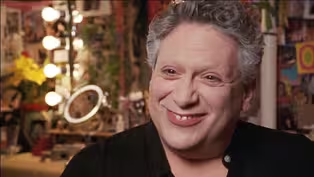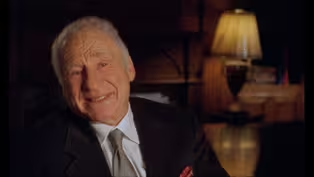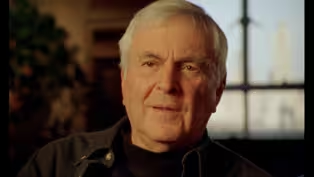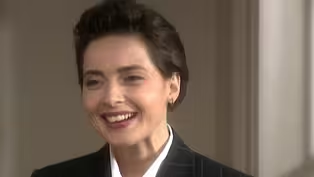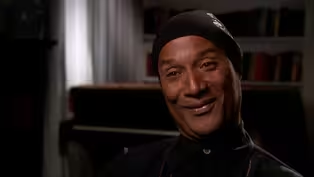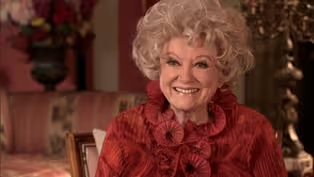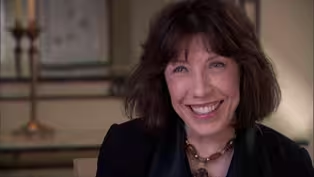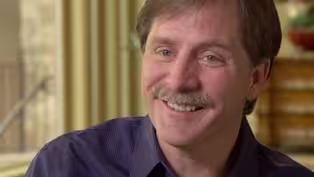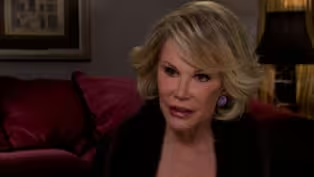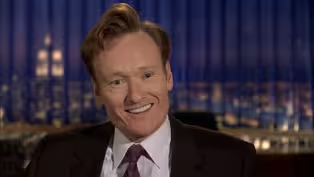
Jerry Lewis on comedy and his bond with Sammy Davis, Jr.
Special | 9m 45sVideo has Closed Captions
Jerry Lewis talks about becoming a comedian and his friendship with Sammy Davis, Jr.
On August 3, 2015, Jerry Lewis sat down for a conversation about his path to becoming a comedian and how his and Sammy Davis, Jr.'s careers and lives were intertwined through a lifelong friendship and mutual respect. Interview conducted for "Sammy Davis Jr.: I've Gotta Be Me" (2019).
Problems playing video? | Closed Captioning Feedback
Problems playing video? | Closed Captioning Feedback
Support for American Masters is provided by the Corporation for Public Broadcasting, AARP, Rosalind P. Walter Foundation, Judith and Burton Resnick, Blanche and Hayward Cirker Charitable Lead Annuity Trust, Koo...

Jerry Lewis on comedy and his bond with Sammy Davis, Jr.
Special | 9m 45sVideo has Closed Captions
On August 3, 2015, Jerry Lewis sat down for a conversation about his path to becoming a comedian and how his and Sammy Davis, Jr.'s careers and lives were intertwined through a lifelong friendship and mutual respect. Interview conducted for "Sammy Davis Jr.: I've Gotta Be Me" (2019).
Problems playing video? | Closed Captioning Feedback
How to Watch American Masters
American Masters is available to stream on pbs.org and the free PBS App, available on iPhone, Apple TV, Android TV, Android smartphones, Amazon Fire TV, Amazon Fire Tablet, Roku, Samsung Smart TV, and Vizio.
Buy Now
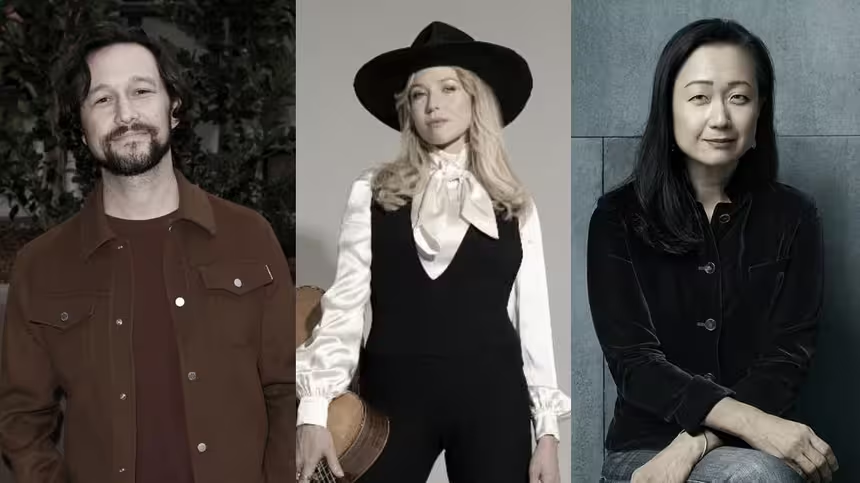
A front row seat to the creative process
How do today’s masters create their art? Each episode an artist reveals how they brought their creative work to life. Hear from artists across disciplines, like actor Joseph Gordon-Levitt, singer-songwriter Jewel, author Min Jin Lee, and more on our podcast "American Masters: Creative Spark."Providing Support for PBS.org
Learn Moreabout PBS online sponsorshipMore from This Collection
Watch curated interviews from The American Masters Digital Archive. The full collection includes over 1,000 hours of never-before-seen, raw interviews: a treasure trove of the movers and shakers of American culture, including Maya Angelou, Patti Smith, Mel Brooks, Carol Burnett, Matthew Broderick, Carl Reiner, Joan Rivers, Dionne Warwick, Lee Grant, Sidney Lumet, Betty White and many others.
Harvey Fierstein on gay representation on Broadway and its deep history
Video has Closed Captions
Harvey Fierstein talks to director Michael Kantor backstage during the production of "Hairspray." (13m 8s)
Video has Closed Captions
Ringo Starr describes his friendship with Mae West. (10m)
Mel Brooks' wild ride to his first Broadway show ever
Video has Closed Captions
Mel Brooks talks about the first Broadway show he ever saw—Cole Porter's "Anything Goes." (5m 44s)
John Kander and Fred Ebb on “Cabaret,” creativity and collaboration
Video has Closed Captions
Composer John Kander and lyricist Fred Ebb talk about how they have worked together. (5m 56s)
Isabella Rossellini compares her acting and modeling
Video has Closed Captions
Isabella Rossellini discusses her acting versus modeling career. (28m 24s)
Quincy Jones explains how he got started in music
Video has Closed Captions
Quincy Jones discusses his early career, friendships and how he defines himself. (15m)
Paul Mooney on his career and relationship with Richard Pryor
Video has Closed Captions
Paul Mooney reflects on the mechanics of stand-up and his role as Richard Pryor's best friend. (10m 39s)
How Phyllis Diller broke down the doors for female comics
Video has Closed Captions
Phyllis Diller reflects on how her comedy was a response to years of “take my wife” jokes. (11m 35s)
How Lily Tomlin found liberation in exploring her Laugh-In characters
Video has Closed Captions
Lily Tomlin speaks about her time on Laugh-In and how she developed her characters. (12m 35s)
Jeff Foxworthy on how every American might be a "redneck"
Video has Closed Captions
Jeff Foxworthy discusses regionalism in comedy and why "redneck" is a state of mind. (15m 41s)
Joan Rivers finds humor in being yourself
Video has Closed Captions
Joan Rivers speaks about her experience as a female comic in the early 60s. (9m 59s)
Conan O’Brien gets serious about silliness
Video has Closed Captions
Conan O’Brien speaks about his style of late night and his reason for doing comedy. (15m 32s)
Providing Support for PBS.org
Learn Moreabout PBS online sponsorship- The first time I saw Sammy was at Ciro's in Los Angeles in around 1950.
Absolute hysterical performance.
He did two hours of nonstop entertainment.
Sat there in shock.
You sat like this.
"Is he done?"
"Yeah, he's done."
You just had the once in a lifetime performance thrown at you.
And I don't know of anyone that I knew, and I have a lot of friends in Hollywood, that all said the exact same thing I did after they saw him, and they saw the greatness, and they all had the same anticipation that I did, "Dear God, let him score.
Let him just come up and be that absolute perfect."
And he was.
He was.
- [Interviewer] You said he said you were like family.
- Oh yeah.
- [Interviewer] Why is that?
- Well, because everything I did, he wanted to do.
I said, "You're never gonna find an Italian singer, so you can't do that."
But everything that he saw me do, I'd walk into a camera shop and spend $11,000, and Sammy was still looking to earn a buck, but as he developed, he did everything I did.
Clothes, I mean, I had somewhere between 100 and 200 suits a year made, 24 tuxes, shirts, Christ, they were coming to me at four dozen a clip.
And then he called me one day, and he said, "Why are my shirts costing me $4,000?"
I said, "Because you want the best, and you have to pay for the best."
And the only thing he did that I didn't do was cook.
He was a fabulous cook.
We would do two shows a night at Bally's, and at three in the morning, he'd be making us southern fried chicken in the suite upstairs at the Bally.
(beep) Almighty, it was incredible.
Whenever he and I would talk about the business, I'd be correcting him.
But I always said to him, "This correction I'm giving, you will never hear from me again.
Because if you don't nail it, I'm never gonna tell you anything again."
And he respected my knowledge.
I had been performing, at the time I met Sammy, I had already been performing 30 years.
And the lessons that I got from my dad was like going to Brandeis University or ITT.
The education that I got from my dad is inconceivable.
Frank Kruczek of the London Royal Academy said to me, "Your father, sounds to us, like he was an apostle."
I said, "He was."
He was just that.
My father taught me about the importance of respecting your audience.
Don't walk out on that stage believing they'll be there because you are there.
(beep) They're there 'cause they wanna see you and you better treat it with infinite dignity.
And you go out on that stage for one purpose.
That's to entertain that audience.
- [Interviewer] Sam Sr. And Will Maston.
What did they teach Sammy?
- Well, Sam Sr. And Will Maston were the two old timers that could give 'em all the information about the past.
And I used to say to Sammy, "Get the past outta your head.
You have to concentrate on now and what you're doing now.
Forget how good it was eight years ago.
Now.
Make it good now."
So it became, "Preacher," every time I opened my mouth.
"Preacher," I said, "I love you."
I'm not gonna be, I'm not gonna be some, some kind of schmuck that sits there and when everybody yells, "Terrific," he yells, "Terrific."
I'm telling you what I know from my heart.
And I would talk to Sammy from a place men don't talk from.
Men, in general, don't go there.
But I loved him so much and cared so desperately for him that I used to dig so deep that after we left one another, I'd have a headache.
So he used to send me a aspirin every couple of weeks.
- [Interviewer] What was it like hosting "The Sammy Davis Jr. Show"?
- Terrific.
Hosting Sammy's show was terrific.
None of us thought it was gonna last very long, but we wanted to help him.
And you know, television takes some of the humanity out of it.
When you see him on stage in a theater, you're seeing another Sammy than the one that's on television.
Different man.
He brought a different ability to the stage that he didn't bring to television because it was different.
He couldn't feel the connection with his audience like he did in a theater.
And I would say to him, "You have to start regulating your mind that that's just as important as the theater.
You gotta start getting that to work."
So I was constantly preaching.
- [Interviewer] Sammy used to end his shows by impersonating you.
- Yeah.
- [Interviewer] How did that feel?
- Oh, it was wonderful.
He did it great.
He did it great.
Yeah, he would always finish the show impersonating me, and I would give him, after a show, "I'd say, let's rehearse that once because you haven't got it yet."
And he and I had fun together, but the most important time together we had was the learning process.
And he admitted to me a hundred times, he said, "I think our friendship is the most important thing in my life."
He said, "But without you, I'd probably be 25 years to get to where I am now."
And between Frank and myself, we gave him the kind of an education that you would have to go Carnegie Tech to get it.
- [Interviewer] He referred to you as his best friend.
Can you comment on that?
- Being his best friend.?
- [Interviewer] Yeah.
- Why does the President of the United States, that taps a little boy on the head, why do the parents think the little boy is now special?
Same thing.
Exact same thing.
Sammy was, of all of the things we can say about him, the most critical element in Sammy's life was his sensitivity, his understanding of what racism was.
And he almost forgave him.
And I said to him, "Why would you forgive him?"
He said, "Because I have no recourse.
What am I gonna do, blast them?"
I've been blasting them all my life, so now I'm gonna say they're okay."
So, he was working very, very hard at understanding his lot in life.
But when it came to going on stage, he didn't bring any of that stuff.
He brought all of his theatrical know-how, and entertained an audience like they'd never been entertained in their lives.
- [Interviewer] How transgressive, how subversive was it when Sammy started imitating white famous actors?
- It didn't bother me.
- [Interviewer] Okay.
Other people?
- Nah.
No, a lot of people took the black issue too far.
And the black issue is something that we're living with for 400 years.
And I keep beating him over the head, "You're not a black man going on a stage.
You are a wonderful short one-eyed Jew that goes on a stage."
But we laughed about the racism.
You had to, because there was no way to correct it.
The only thing that Sammy had was his ability to make you understand he's just a man.
A man.
Short, I'll agree, but a man.
Support for PBS provided by:
Support for American Masters is provided by the Corporation for Public Broadcasting, AARP, Rosalind P. Walter Foundation, Judith and Burton Resnick, Blanche and Hayward Cirker Charitable Lead Annuity Trust, Koo...

